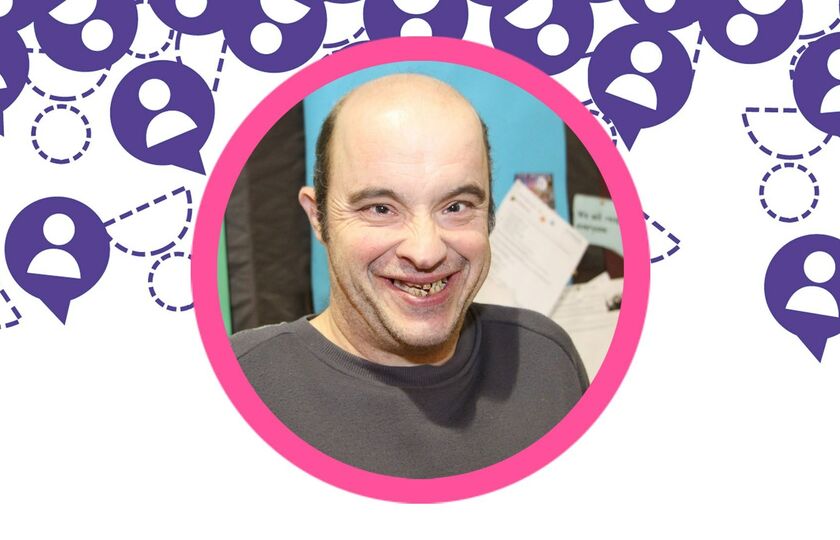Equality and human rights commission guidance
Supported Loving toolkit
Sexual rights

Sexual rights are human rights related to sexuality. These rights are often an under-acknowledged area of sexuality and relationship support, but are very important.
What rights do people have?
This toolkit page focuses on arguably the most important, and often under-acknowledged, area of sexuality and relationship support - rights! Sexual rights are human rights related to sexuality. As social care providers, we would (hopefully) never intentionally breach the human rights of a person we are supporting. However, the reality is that breaches occur frequently, often unknowingly, sometimes as directed by professionals who were sought for their advice/input. Therefore, it is fundamental that social care staff are aware of everyone’s human rights in this area, so they can advocate effectively and challenge, if needed, to assist and uphold the rights of people they support.
Organisations (including social care providers) have a legal obligation to protect human rights. Rights in the Human Rights Act (HRA) are legally enforceable, meaning if someone’s sexual rights have been breached, they can take organisations to court, which has happened but we are not aware of this happening often.
There are several articles under the Human Rights Act (HRA) that relate to sex and relationships:
Article 8 - Respect for your private and family life, home and correspondence
This protects our sexual autonomy, including the right to live with someone and enjoy their company, the right to develop relationships as free from interference as possible, and the right to have information about our sexuality and relationships kept private.
Article 10 - Freedom of expression and the right to receive information
This protects our right to receive information and ideas to make decisions, including information about sex.
Article 12 - The right of people of marriageable age to marry and start a family
The rights above could potentially be interfered with (unlike absolute rights like freedom from torture) if there a specific reason lawful reason (eg to prevent a crime).
The World Health Organisation's (WHO) working definition of sexual rights includes the right of all persons, free of coercion, discrimination and violence, to:
- the highest attainable standard of sexual health, including access to sexual and reproductive health care services
- seek, receive and impart information related to sexuality
- sexuality education
- respect for bodily integrity
- choose their partner
- decide to be sexually active or not
- consensual sexual relations
- consensual marriage
- decide whether, and when, to have children, and
- pursue a satisfying, safe and pleasurable sexual life.
What are the most common challenges faced in this area and how best to support people to overcome them?
Denial of sexuality – Perhaps the most common issue faced by many people who access support (such as people with a learning disability, autistic people, and older people) is the denial of their sexuality and/or their need for intimate relationships. For older people, they are often seen as, 'past it', and that it is no longer important. Autistic people are often incorrectly assumed to be uninterested in sex or relationships. Similarly for people with a learning disability, staff may assume they are not interested or lack capacity. Everyone needs to be aware that all humans are sexual beings and how this is expressed may differ, but it is a fundamental aspect of being human. Sexuality and relationship needs should be treated as any other support need and included in support planning, assessments and the provision of double beds as standard.
Privacy - A lack of privacy is a common issue where people receive 24-hour support. Research across social care groups shows people are often limited to the amount of privacy they can have with a partner. We have heard of people being told to leave their bedroom door open or not being allowed to have a partner stay overnight in their bed. Care homes supporting people with various needs (eg older adults, mental health and learning disabilities) typically provide single beds, so it would not be possible to have an overnight guest. People may be unable to go out unsupported, so have staff present on dates. Organisations need to explore how they can give people privacy to allow space for intimate relationships to develop/be maintained. If there are concerns regarding a person’s capacity regarding sexual relations and being alone with a partner, this must be addressed as soon as possible. However, if there are no concerns, people must be allowed privacy in their own home. (See toolkit page on capacity.)
Access to education and support - Under the HRA, people have the right to receive information in a way they understand, to be able to make decisions regarding their sexuality and relationships. The WHO’s definition also incorporates the right to relationships and sex education (RSE). Many people with learning disabilities and/or autistic people have not received RSE, or had it provided in a way they understand. The Care Quality Commission (CQC) support this by stating that providers must make sure people have access to education and information to help them develop and maintain relationships and express their sexuality.
Contraception and children - Research (McCarthy 2009; Ledger et al. 2016) shows that people with learning disabilities are often excluded from decisions regarding contraceptive choices and there is a preference for long-acting contraception to avoid pregnancy. The HRA includes the right to start a family, and there is a long-standing prejudice about certain groups of people becoming parents. If a person wanted a child and those around them sought to restrict this person against their will, then such a contentious issue would need to be referred to the Court of Protection. We need to empower people to make informed choices surrounding contraception, using accessible information and education. (See toolkit page on contraception for more information.)
Watch Professor Claire De Than’s presentation on supporting the human right to have fun - how sex, relationships, intimacy, loving and the law fit together.
Do...
- educate yourself on people’s rights regarding sexuality and relationships
- make sure people are aware of their own rights and receive education if needed
- respect peoples’ right to make decisions in this area, even if you don’t agree.
Don't...
- see rights in this area as different to any other area – they are important human rights
- ignore the importance of the HRA and give an unequal focus to safeguarding
- allow human rights’ breaches to go unexamined – you must raise concerns if you feel this is happening without there being a reason prescribed in law.
Case study
Tanisha, a 25-year-old autistic woman with a mild learning disability recently moved from her family home to live with her friend Evie. They receive 24-hour support from a local provider organisation. Tanisha wants her boyfriend Jaylen to visit. Staff are worried about Tanisha getting pregnant and are not sure what she knows about sex. They decide to make sure the couple leave the bedroom door open, and staff keep a regular check on them. Tanisha gets upset as they have no privacy. Staff are worried about mentioning sex to Tanisha in case it puts ideas in her head.
A new manager, Gloria starts at the company and explains that staff are potentially breaching Tanisha’s human rights. They are restricting her right to develop relationships as free from interference as possible, and the right to have information about her relationships kept private, by sharing their concerns with her parents. Gloria meets with Tanisha, and they talk about her relationship with Jaylen - how it is going and what support she thinks she might need from staff. Gloria asks her if she has ever received any relationships and sex education. Tanisha covered this topic in college and knows quite a lot about it! She says the couple would like a sexual relationship. Gloria looks at the criteria for capacity for sexual relations (see toolkit page) and feels confident that Tanisha can consent. However, she might need some help deciding what contraception to use. Gloria books an appointment with the local sexual health clinic to discuss this. Tanisha, with support from her team and nurse, chooses an implant. As they both have no previous sexual partners and are in a monogamous relationship, they do not need to use condoms. Staff are told to make sure they knock before entering her bedroom and wait for a response to enter.
Top tips
- Treat people’s relationships the same as you would your own - if you would not put up with something – why should the person you support?
- Make sure human rights are respected and reflected throughout your organisation. This is not an ‘add on.’
- Think about how someone's environment may limits their relationships eg only having a single bed or single chairs.
- If, due to capacity/other issues, people’s rights need to be restricted, how can we make the most of what they are able to do? Eg if a person lacks capacity for sex, how do we still support their relationship to continue in other ways?
Dr Claire Bates, Supported Loving Leader
The views expressed in the Supported Loving toolkit are not necessarily those of Choice Support.
Resources
Information on the Human Rights Act (HRA)
Sexual rights of young people with learning disabilities
Manual for sensitizing intermediaries on sexual rights of young people with learning disabilities.
Sexual and reproductive health - World Health Organisation
World Health Organisation's (WHO) working definition on sexual and reproductive rights
Sexuality and Relationships - My Rights Charter
My Life My Choice, the Supported Loving network, the National Development Team for Inclusion (NDTi), and the Tizard Centre at the University of Kent developed the charter based on the findings of two academic research projects on relationships.





